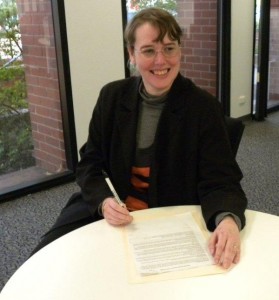women in careers: kellie the electrical engineer
Kellie, Electrical Engineer
Straying from her original intentions of become a lawyer, Kellie says her decision to become an electrical engineer was quite random.
“I went to a university open day with a vague interest in computers, and the only tour I could get on was Electrical Engineering,” she says.
“From there I was fascinated, particularly with a video of testing to destruction of a switchboard.”
Completing a bachelor of Engineering in Electrical Engineering at University of South Australia with Honours, Kellie then went on to enter a three year graduate program with ETSA Utilities. She then completed further studies with ETSA Utilities, including a Graduate Certificate in infrastructure management, and diplomas in frontline management and project management.
Being an Electrical Engineer comes with its perks. “It’s a flexible role, and can lead to work almost anywhere,” she says.
From electrical distribution companies, mine sites, defence, manufacturing and basically anywhere that uses electricity, the employment opportunities for this profession can vary from onsite to office based or even a mix of the two.
“Even when you’re based on site, you can still return into an office when the weather is miserable.”
With a high demand for electrical engineers, Kellie was offered a job before finishing her final exam and within a week of graduation, all her peers had gained employment too.
“This high demand continues, and should remain stable into the future.”
The role of the electrical engineer is full of varied and unexpected tasks. From authorising drawings, off road driving, flying interstate and internationally, chairing meetings, getting coffee, programming PLC’s, taking minutes, getting lost, dealing with voltage complaints, completing harmonic investigations, programming GUI, cleaning, wiring panels, official gate opener, programming robots, working on a mine site (FIFO) and being chased by cows… But that’s certainly not all.
Kellie also writes reports, does trigonometry, leads young engineers, manages an administrative team and subcontractors, creates schedules, provides estimates, calculates contingency event affects, models the transmission system, and sometimes gets cars bogged in sand dunes. And this is just Kellie’s list. “If you talk to an electrical engineer in manufacturing, or the defence industry, the list will change!”
With all this busy work, I asked Kellie about the cons of her profession, and she replied with getting up early for sunrise starts either onsite or flying either starting on site or catching flights.
“I’m not an early morning person, and firmly believe that seeing 5:00 on a clock should only be reserved for PM.” Although with the sunrises that in hindsight, were “pretty amazing” to witness, Kellie says that it’s more of a con with a positive to her profession.
As for advice if you’re interested in engineering as a career, Kellie says to not be put off by the math and physics requirements. “I’m not naturally gifted at maths, but I’m interested in it. The course pre-requisites are there to ensure you are competent, rather than brilliant at a specific area. Engineering expands on the maths you may have previously done, and then lets you understand the practical applications to it.”
If you’re not particularly keen on a university degree, there are other avenues. “I would also encourage young ladies and gentlemen to consider apprenticeships. An apprenticeship will give you an excellent qualification and the demand for all types of trades is very strong.”
When it comes to the big show of looking for work, doing your homework is really important. Kellie says it’s best to look for well established companies that can offer opportunities such as graduate or apprenticeship programs that will provide support and friends along the way.
“When you have completed your qualifications and begin looking for a role, you need to look at the company you are applying for. “
“I recommend you research the company, look at their areas of work and their general ethos, and make sure it matches where you want to be.” She also suggests using the interview opportunity for your advantage and expectations. “Look at the office space, how it is set up, is it noisy, is it relaxed or serious?”, and most importantly, is it somewhere you’d like to work?
Whether your professional journey starts with university, TAFE or an apprenticeship, it’s important to see where that qualification is going to take you. Be sure to think about the availability and location of the jobs you’re after.
“The best thing about apprenticeships and university degrees, is that once you have your qualification, it stays with you, wherever you roles may take you, and you can always come back to it.”


